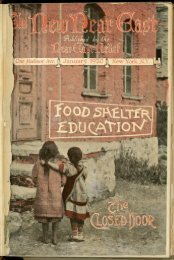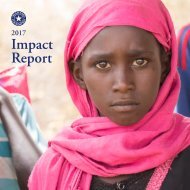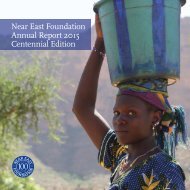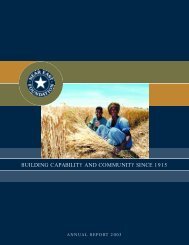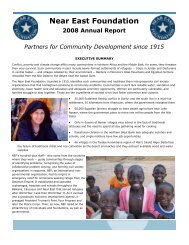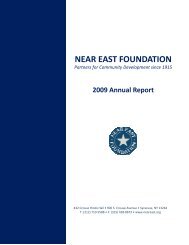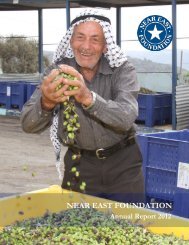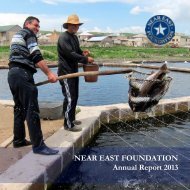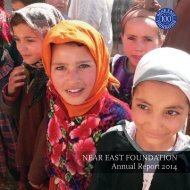2016 Annual report_final for web
You also want an ePaper? Increase the reach of your titles
YUMPU automatically turns print PDFs into web optimized ePapers that Google loves.
Near East Foundation<br />
<strong>Annual</strong> Report <strong>2016</strong>
Contents<br />
2 Who We Are<br />
4 Responding to the Refugee Crisis<br />
6 Microenterprise Development<br />
10 Building Peace<br />
13 Natural Resource Management<br />
19 Financials<br />
20 Acknowledgments
A Message from the NEF Board Chairman and President<br />
Dear Friends,<br />
One year has passed since we last updated you on the work of<br />
the Near East Foundation (NEF)—and what a year it has been<br />
<strong>for</strong> our nation and the world. As we continue to deal with the<br />
largest humanitarian crisis since WWII, persistent political and<br />
social turmoil, and decreasing humanitarian assistance, there<br />
are legitimate reasons to feel discouraged. Yet, in spite of these<br />
challenges—and perhaps because of them, NEF’s work has never<br />
been more relevant or important than it is today. We remain<br />
dedicated to the people and communities we serves, bringing<br />
creative solutions to poverty, displacement, and vulnerability. <strong>2016</strong><br />
was a year of great achievement and steady progress <strong>for</strong> NEF.<br />
There are many humanitarian organizations responding to the<br />
same issues and crises as NEF. However, what distinguishes NEF<br />
from the others and allows it to have a significant impact is how<br />
we go about our work: developing long-term relationships with<br />
communities, working hand-in-hand with them to confront the<br />
challenges they face, and creating lasting opportunities <strong>for</strong> families<br />
to improve their lives and livelihoods in spite of adversity.<br />
We believe NEF’s community-led initiatives empower<br />
vulnerable individuals—often through improvements in their<br />
abilities to earn a safe and dignified living—and pave the way <strong>for</strong><br />
them to thrive and contribute to their communities and economies<br />
well into the future. The success of our programs is possible<br />
because NEF teams work on the ground, side-by-side, with<br />
refugee and other underserved populations to help them develop<br />
sustainable solutions and create opportunity from within.<br />
Over the past few years, NEF has continued to raise the bar<br />
<strong>for</strong> itself, its programs, and its impact. While the environment<br />
in which we operate is often challenging, we are pleased to<br />
<strong>report</strong> NEF is entering the next fiscal year with a robust portfolio<br />
of significant initiatives and in a strong financial position to<br />
implement them effectively. This positive <strong>for</strong>ecast has been made<br />
possible by your generosity, and we hope you will take great pride<br />
in knowing your support has directly contributed to improving the<br />
lives of some of the most vulnerable people in the world. For that<br />
we thank you.<br />
As NEF enters a new chapter of growth, we are committed to<br />
working toward meaningful change in the communities in which<br />
we work. Without question, the continued support of our donors<br />
and partners is key to helping NEF reach its goal of sustaining<br />
progress, in spite of adversity, in the years to come.<br />
With sincere gratitude,<br />
Robert J. Solomon<br />
Board Chairman<br />
Charles Benjamin, Ph.D.<br />
President<br />
1 | NEF <strong>2016</strong> <strong>Annual</strong> Report
Who We Are<br />
Our Mission<br />
The Near East Foundation helps trans<strong>for</strong>m the lives of vulnerable<br />
people each year by building more sustainable, prosperous,<br />
and inclusive communities in the Middle East, Caucuses, and<br />
Africa through education, community organizing, and economic<br />
development initiatives.<br />
Our Vision<br />
To address the immediate needs of vulnerable, conflict-affected<br />
people while enabling their self-sufficiency and economic<br />
resilience.<br />
Our Approach<br />
Empowerment and Self-Sufficiency<br />
• Identify local needs and priorities through deep relationships<br />
and trust with communities.<br />
• Build the capacity of local communities to solve their own<br />
development challenges through long-term solutions.<br />
• Invest in local people, organizations, and governance systems<br />
to deliver inclusive, sustainable solutions that are appropriate<br />
to the local context.<br />
NEF focuses its ef<strong>for</strong>ts on three main program areas:<br />
Microenterprise Development<br />
Peacebuilding through Economic Cooperation<br />
Natural Resource Management and<br />
Adaptation to Climate Change<br />
Microenterprise development is one of the<br />
most effective ways to create jobs and generate<br />
income <strong>for</strong> disadvantaged communities in<br />
the region, while also improving the economy<br />
as a whole. NEF promotes the economic<br />
independence and social resilience of<br />
vulnerable individuals who must overcome<br />
social barriers, lack of job skills or business<br />
management experience, and limited access to<br />
credit through entrepreneurship, microcredit,<br />
and peer networks.<br />
Many of the communities where NEF works<br />
are characterized by recurring conflict.<br />
NEF’s approach to build peace in these<br />
communities focuses on core livelihood<br />
issues in a given area and helps populations<br />
find mutual interests to benefit through<br />
economic cooperation. By focusing on these<br />
issues, NEF frames conflict mitigation and<br />
reconciliation in terms of practical and<br />
immediate concerns <strong>for</strong> average citizens.<br />
NEF enables communities to use their<br />
resources more efficiently to better adapt<br />
to and prepare <strong>for</strong> shocks caused by a<br />
rapidly changing climate. By harnessing<br />
nonconventional water resources, introducing<br />
water-efficient crops, and adopting improved<br />
irrigation technologies, NEF is increasing local<br />
capacity to manage agriculture and natural<br />
resources sustainably in the long-term.<br />
Near East Foundation UK<br />
NEF UK was established in 2012 to advance the shared values and mission<br />
of NEF. Guided by an independent Board of Directors, NEF UK shares a<br />
common vision and approach to building more sustainable, prosperous,<br />
and inclusive communities through economic development, community<br />
organizing, and education.<br />
Current programs include improving children’s access to primary school<br />
in Morocco, helping survivors of gender-based violence in Armenia gain<br />
economic independence, introducing WASH (access to clean water,<br />
sanitation, and hygiene) to vulnerable communities in Sudan, and supporting<br />
aspiring women entrepreneurs in Palestine to grow their businesses.<br />
For more in<strong>for</strong>mation visit: www.neareast.org/uk<br />
NEF <strong>2016</strong> <strong>Annual</strong> Report | 2
Where We Work<br />
NEF’s innovative and cost-effective programs are led and staffed<br />
by established local teams who partner with local organizations<br />
to find homegrown solutions to their development problems.<br />
NEF currently has active projects in eight countries:<br />
Armenia, Jordan, Lebanon, Mali, Morocco, the Palestinian<br />
Territories, Senegal, and Sudan. Teams based in Syracuse<br />
(New York) and London (England) provide program<br />
development, communications, project management, and<br />
administrative support.<br />
NEF’s grassroots approach helps to make<br />
it a unique and impactful partner.<br />
ARMENIA<br />
LEBANON<br />
MOROCCO<br />
PALESTINE<br />
MALI<br />
SUDAN<br />
JORDAN<br />
SENEGAL<br />
Knowledge, Voice, Enterprise<br />
At the heart of everything NEF does is the conviction that <strong>for</strong> people to participate in the development of their communities<br />
and countries they need: KNOWLEDGE to participate effectively in civic and economic life; a VOICE in public decisions that<br />
affect their well-being; and meaningful and dignified ways to make a living—ENTERPRISE.<br />
3 | NEF <strong>2016</strong> <strong>Annual</strong> Report
RESPONDING TO THE REFUGEE CRISIS<br />
“We left everything behind, we came here with nothing.”<br />
– Fattoum, a Syrian refugee now living in Lebanon<br />
NEF was founded in 1915 as a response to the Armenian Genocide<br />
to help hundreds of thousands of displaced Armenians, Assyrians,<br />
and Anatolian Greeks that were persecuted after the fall of<br />
the Ottoman Empire. Today, as the conflict in the Middle East<br />
continues and humanitarian aid declines, our experiences and<br />
lessons learned from our work more than a century ago are now<br />
more relevant than ever.<br />
With the Syrian crisis entering its sixth year, there are now an<br />
estimated 4.8 million men, women, and children who have fled<br />
Syria to neighboring countries <strong>for</strong> safety. The conflict has farreaching<br />
humanitarian consequences on both refugees and the<br />
countries hosting them.<br />
lorem ipsum dolor xconsequat lorem ipsum dor consequat.<br />
A mother carries her child on her back after being displaced from<br />
their home after World War I. Beirut, c. 1922. Nellie Miller Mann<br />
Collection.<br />
Vicky, a Syrian refugee now living in Lebanon, stands with her<br />
daughter. Vicky started at-home catering to earn an income after<br />
receiving training and cash assistance from NEF.<br />
NEF <strong>2016</strong> <strong>Annual</strong> Report | 4
Jordan and Lebanon<br />
In response to this on-going crisis, NEF works with both refugees<br />
and affected host communities in Jordan and Lebanon to develop<br />
inclusive opportunities that enable them to earn a living and build<br />
resilience against future shocks in a manner that preserves their<br />
dignity, autonomy, and safety. NEF’s programs strengthen the<br />
capacity of both communities to recover from crisis and emerge<br />
from poverty through business and economic development,<br />
employability training, vocational training tied to local markets,<br />
financial literacy, and cash assistance.<br />
NEF’s refugee assistance programs are funded by the U.S.<br />
Department of State-Bureau of Population, Refugees, and<br />
Migration (BPRM), City and Guilds, MEDAIR, Bogosian Quigley<br />
Foundation, Global Giving Foundation, and the Cleveland H.<br />
Dodge Foundation.<br />
“NEF’s financial support helped me to start my clothing business<br />
and has helped me to contribute to the household expenses,<br />
especially my daughter’s schooling expenses. The training that<br />
was provided on developing a business plan taught me to rethink<br />
how to calculate the cost of goods, and also helped me to get rid<br />
of shyness when dealing with customers and suppliers.”<br />
— Ghousoun, a Jordanian woman who attended NEF’s business<br />
development trainings<br />
“Wherever I went, doors closed in my face. But then, I went to the<br />
Near East Foundation and they helped me. I know how to work,<br />
but I lacked the equipment and the materials because I had no<br />
money. I chose to make confectionaries from home and I was<br />
surprised by the number of customers I found. NEF helped me<br />
regain self-confidence and peace of mind, which I had lost coming<br />
from a war zone. They help women to see that they have an<br />
important role and a right to participate in society.”<br />
— Rokan, Syrian refugee living in Lebanon with her husband and<br />
daughter<br />
<strong>2016</strong> HIGHLIGHTS<br />
• 82% of Syrian refugees <strong>report</strong>ed a higher household<br />
income after participating in NEF’s project.<br />
• 63% of Syrian women <strong>report</strong> increased self-confidence and<br />
control over their lives.<br />
• 1,085 Iraqi and Syrian refugees have benefitted from<br />
business and employability trainings and cash assistance.<br />
• 914 new businesses were launched in Jordan and Lebanon<br />
(651 by women)—91% of which have plans to expand.<br />
5 | NEF <strong>2016</strong> <strong>Annual</strong> Report
MICROENTERPRISE DEVELOPMENT<br />
While providing economic development, employability and<br />
vocational training, cash assistance, and social networking <strong>for</strong><br />
refugees and other vulnerable individuals drives NEF’s work in<br />
Jordan and Lebanon, NEF also helps to improve the economic<br />
opportunity of rural and urban poor, disenfranchised youth, and<br />
victims of domestic violence in Armenia, Morocco, Sudan, and<br />
Palestine.<br />
NEF takes a community-based approach to inclusive economic<br />
development by working with and through local associations to<br />
create such plat<strong>for</strong>ms as ongoing training programs, business<br />
incubators, and start-up funds to help economically marginalized<br />
people gain the business skills and resources they need to start<br />
small businesses of their own.<br />
NETWORKING<br />
ONGOING<br />
MONITORING<br />
AND SUPPORT<br />
STARTUP<br />
FUNDING<br />
MICROENTERPRISE<br />
DEVELOPMENT<br />
PARTICIPATORY<br />
ASSESSMENTS<br />
BUSINESS PLAN<br />
DEVELOPMENT<br />
SUPPORT<br />
TRAINING/SKILLS<br />
DEVELOPMENT<br />
Nelly, a Palestinian entrepreneur, expanded her at-home catering business to a dine-in cafeteria after attending NEF’s business<br />
development trainings. Photo credit: Tamara Abdul on behalf of the Cherie Blair Foundation <strong>for</strong> Women.<br />
NEF <strong>2016</strong> <strong>Annual</strong> Report | 6
Armenia<br />
Domestic violence and conservative gendered norms are<br />
widespread in Armenia, where 66 percent of women have<br />
<strong>report</strong>ed being assaulted by their domestic partners. NEF helps<br />
women survivors of gender-based violence achieve economic<br />
independence through vocational training, entrepreneurship<br />
skill building, and business and financial support to help them<br />
launch small businesses. Working with community associations<br />
in four regions, NEF has organized policy roundtables and public<br />
<strong>for</strong>ums to raise awareness and start dialogue around gender-based<br />
violence, protection strategies, and gender equality.<br />
NEF’s microenterprise work in Armenia is funded by the<br />
European Union.<br />
“The training equipped me with the confidence and skills I needed<br />
to turn my passion <strong>for</strong> baking into a profession. I now earn<br />
enough of an income to support my children and myself. Today,<br />
instead of dwelling on the difficulties I have experienced in my<br />
life, I focus on the successes I have achieved.”<br />
— Armenian woman who participated in NEF’s small business<br />
development training<br />
<strong>2016</strong> HIGHLIGHTS<br />
• 129 women developed business plans; 128 received grants<br />
to support their businesses.<br />
• 91 women developed career/learning plans and CVs.<br />
• 90% of survivors of gender-based violence (GBV) <strong>report</strong>ed<br />
improved agency, self-reliance, economic independence,<br />
and reduced GBV.<br />
Palestine<br />
Although women are key players in the Palestinian economy,<br />
Palestine has one of the lowest female labor participation rates in<br />
the world. Hindered by social norms, limited access to financial<br />
resources, and lack of institutional support, the role of women in<br />
the economy is largely in<strong>for</strong>mal and uncompensated. In addition<br />
to helping Palestinian women launch start-up businesses in rural<br />
areas, NEF focuses on the “missing middle” of women who have<br />
existing businesses ready to be taken to scale.<br />
NEF works in partnership with the Cherie Blair Foundation <strong>for</strong><br />
Women and with the support of the Oak Foundation and the<br />
Trafigura Foundation. The Rangoonwala Foundation supports<br />
NEF’s work in women’s microenterprise and microfranchising.<br />
<strong>2016</strong> HIGHLIGHTS<br />
• 330 new jobs were created <strong>for</strong> women.<br />
• 242 women launched or significantly expanded their<br />
businesses.<br />
• 408 women attended business development trainings;<br />
317 developed business plans.<br />
“Every woman should have a specific goal and vision and depend<br />
on herself to achieve her goals and dreams. If a woman starts her<br />
business and she fails, that does not mean she should give up!<br />
She should learn from her experiences and start again.”<br />
— Fatmeh, who went from being a cafeteria chef to a restaurant<br />
owner with NEF’s help<br />
Photo credit: Tamara Abdul on behalf of the Cherie Blair Foundation <strong>for</strong> Women.<br />
7 | NEF <strong>2016</strong> <strong>Annual</strong> Report
Morocco<br />
With more than 50 percent of Morocco’s young working-age<br />
population out of school and out of work, youth unemployment<br />
is a serious concern. Working with youth councils in two coastal<br />
provinces, NEF is organizing business training programs,<br />
incubators, and support networks to help young people start their<br />
own businesses in the <strong>for</strong>mal sector. The businesses launched are<br />
not only contributing to Morocco’s economy and creating jobs,<br />
but also introducing unique and technologically advanced services<br />
including an urgent care clinic, an herbal and organic personal<br />
care store, art centers, a dental prosthesis clinic, physiotherapy<br />
centers, interior design firms, event production companies, and a<br />
music recording studio.<br />
<strong>2016</strong> HIGHLIGHTS<br />
• 486 youth were trained in microenterprise development.<br />
• 349 developed or improved their business plans.<br />
• 250 youth launched their businesses in a variety of<br />
sectors.<br />
• 85% of youth said that starting their own project made<br />
them more financially independent.<br />
“I didn’t know about the training and coaching sessions when<br />
I joined. I initially joined <strong>for</strong> the financial support, but I was<br />
surprised by how much I learned through the other trainings.<br />
Being selected to join the Rashma microfranchise has been the<br />
most amazing part of the project. My business has helped me feel<br />
more independent. I am happy.”<br />
— Saida, a young entrepreneur who after successfully launching<br />
her own clothing shop partnered with other project participants<br />
to launch the project’s first mircofranchise, Rashma<br />
NEF's microentperise work in Morocco is funded by the U.S.<br />
State Department's Middle East Partnership Initiative (MEPI).<br />
“I learned so much about the process of creating a business—the<br />
necessary administrative papers <strong>for</strong> registration, techniques <strong>for</strong><br />
marketing, and how to handle clients.”<br />
— Kamal, a young doctor from Casablanca who opened up<br />
his own clinic in El Jadida that provides services in general<br />
medicine and medical emergencies<br />
NEF <strong>2016</strong> <strong>Annual</strong> Report | 8
Sudan<br />
Recurring conflict in Sudan has destroyed economic institutions,<br />
markets, and jobs, leaving an overwhelming portion of the<br />
population in poverty. Unemployment continues to be one of the<br />
major issues facing women in the region. To facilitate economic<br />
recovery, NEF is working with women in South Kordofan to<br />
develop women’s cooperative associations that support women’s<br />
involvement in the cultivation and economic benefit of non-wood<br />
<strong>for</strong>est products such as gum arabic and honey.<br />
<strong>2016</strong> HIGHLIGHTS<br />
• 282 individuals received business development trainings<br />
(222 women).<br />
• 13 inter-village women associations established.<br />
• 5,573 community members (4,187 women) have benefitted<br />
from women-led associations being established and<br />
trainings in microenterprise development, specifically in the<br />
non-wood sector.<br />
NEF’s microenterprise work in Sudan is funded by Comic<br />
Relief, European Union, UNDP, and AECOM.<br />
“Because of NEF’s trainings I learned how to expand my business<br />
activities outside of my village, and I am now able to conduct<br />
transactions with the rural financing institution in my area. This<br />
helped me to buy large quantities of my product so that I can<br />
meet my demand.”<br />
— Zainab, a non-wood <strong>for</strong>est product producer from Manhalla<br />
village who expanded her business after attending NEF’s business<br />
management training<br />
Microenterprise Development by the Numbers<br />
PROCESS<br />
OUTCOME<br />
Total<br />
3,870<br />
Total<br />
2,015<br />
Total<br />
1,535<br />
Total<br />
1,560<br />
Total<br />
693<br />
5,390<br />
• Women: 2,007<br />
• Youth: 942<br />
• Women: 1,603<br />
• Youth: 405<br />
• Women: 1,236<br />
• Youth: 299<br />
• Women: 1,090<br />
• Youth: 152<br />
• Women: 443<br />
• Youth: 250<br />
$<br />
People trained in<br />
business development,<br />
financial literacy, or<br />
vocational skills<br />
Business plans<br />
developed by<br />
women and youth<br />
Grants provided<br />
to help expand or<br />
start businesses<br />
Small businesses<br />
started or recovered<br />
(post-conflict)<br />
New jobs created<br />
Households with<br />
increased income<br />
9 | NEF <strong>2016</strong> <strong>Annual</strong> Report
BUILDING PEACE<br />
Conflict is the backdrop to daily life in many of the<br />
communities where NEF works. While conflict expresses itself<br />
in many ways—warfare, competition over natural resources,<br />
occupied lands, or disaffection—poverty is a significant<br />
underlying cause and a consequence. From Sudan to Palestine,<br />
where years of conflict continue to shape everyday life, NEF’s<br />
peace-building programs simultaneously strengthen economic<br />
cooperation and development and promote reconciliation<br />
among groups in conflict.<br />
Building peace requires opportunities <strong>for</strong> collaboration around<br />
issues of common concern and mutual benefit that will help<br />
break down barriers, build relationships and trust, and establish<br />
a foundation to achieve and sustain peace. As a vehicle to reduce<br />
conflict, NEF facilitates grassroots economic cooperation by<br />
introducing innovative approaches to reconciliation through<br />
value chain development, collaborative natural resource<br />
management, and economic reintegration of internally displaced<br />
people and ex-combatants.<br />
Develop<br />
relationships of<br />
trust through<br />
ongoing<br />
communication<br />
and face-to-face<br />
interactions<br />
Develop mutual<br />
understandings<br />
of opportunities<br />
and constraints<br />
Economic<br />
Cooperation &<br />
Shared Natural<br />
Resource<br />
Management<br />
Work together<br />
toward mutual<br />
economic and<br />
social benefits<br />
Dolev (right), an Israeli<br />
beneficiary from NEF's<br />
Youth Agribusiness<br />
Project, with Yasser (left),<br />
his Palestinian colleague,<br />
on the farmland they<br />
cultivate together.<br />
NEF <strong>2016</strong> <strong>Annual</strong> Report | 10
Palestine<br />
In Palestine, thousands of families depend on the olive oil<br />
industry. Through the Olive Oil Without Borders (OOWB)<br />
program, NEF has worked with more than 3,400 olive oil<br />
stakeholders across 58 communities in Israel and Palestine.<br />
By providing training, technical support, modern equipment,<br />
and opportunities <strong>for</strong> cross-border dialogue, strategic planning,<br />
and trade, NEF helps build relationships <strong>for</strong> collaboration and<br />
trust through the development of the region’s olive sector—and<br />
broader economy.<br />
NEF expanded this work into additional sectors, working<br />
with Israeli and Palestinian youth to start joint cross-border<br />
agricultural businesses. In doing so, they create jobs, generate<br />
income, and grow local markets while gaining hands-on<br />
experience in business cooperation and conflict management.<br />
NEF’s peacebuilding work in Palestine is funded by USAID.<br />
“The main reason I wanted to be a part of the [YAP] project<br />
was to gain knowledge. At the beginning, I didn’t want farming<br />
equipment or money, I just wanted to exchange in<strong>for</strong>mation,<br />
knowledge, and experience. There should be an exchange of<br />
experience between Israelis and Palestinians – why? Because the<br />
Israelis and I live on one land.”<br />
— Musa, a Palestinian sheephearder who was able to improve the<br />
health of his sheep and the quality of milk they produced after<br />
working with his Israeli partner, Amin<br />
“OOWB is one of the most important projects in the region,<br />
because it enables Palestinian and Israeli farmers to sit together<br />
and share the problems and challenges we face in the olive<br />
field. This is important <strong>for</strong> small farmers and producers as now,<br />
together, we can produce a higher quality of olive oil so that we<br />
can compete in the global market. This also gave me a chance to<br />
get to know the Palestinian people, travel to their villages, and<br />
discover their culture. This is the first time we have been able to<br />
come together as farmers – not as soldiers or settlers.”<br />
— Ayala Noy Meer, an Israeli olive mill operator<br />
<strong>2016</strong> HIGHLIGHTS<br />
• 1,242 Israelis and Palestinians participated in trainings and<br />
events to build mass support <strong>for</strong> peace and reconciliation.<br />
• 53 joint business plans developed.<br />
Photo credit: USAID<br />
“The cooperation between us has been really great; we help one<br />
another. The project team helped me with gaps in my overall<br />
business acumen…my marketing abilities and how to acquire the<br />
raw materials I need more cost-effectively. I thought that they<br />
[the Israelis] liked to do things on their own and had no interest<br />
in working with us, but my view changed when I saw how they<br />
wanted to work and collaborate with us.”<br />
— Masha’al, a Palestinian entrepreneur, who developed a healthy<br />
coffee-alternative out of date seeds with her Israeli business<br />
partner, Etai<br />
• 117 Palestinian and Israeli youth are involved in joint<br />
economic cooperation partnerships.<br />
• 84% of OOWB participants say they have an increased<br />
positive perception of the ‘other.’<br />
11 | NEF <strong>2016</strong> <strong>Annual</strong> Report
Sudan<br />
In Central Darfur, NEF works with ethnically and economically<br />
diverse communities in Darfur and South Kordofan to<br />
introduce new tools—such as “supra-village” associations, local<br />
conventions, and land use management plans—<strong>for</strong> sharing<br />
natural resources more effectively and <strong>for</strong> promoting inclusive<br />
and sustainable economic and social development.<br />
NEF-supported communities have been able to work together<br />
to improve natural resources through a variety of initiatives,<br />
including community water sources, demarcation of animal<br />
migration corridors, and enrichment of pasture areas used<br />
<strong>for</strong> grazing.<br />
NEF’s peacebuilding work in Sudan is funded by the European<br />
Union and UNDP.<br />
<strong>2016</strong> HIGHLIGHTS<br />
• 138 people have participated in trainings to build support<br />
<strong>for</strong> peace and reconciliation.<br />
• 93 community leaders trained in mediation and conflict<br />
prevention.<br />
• 500 villagers have attended events that focus on the<br />
important role women play in raising awareness about<br />
peace.<br />
“I personally have benefited from the trainings and applied what<br />
I have learned about reconciliation, mediation, and negotiation.<br />
Yesterday in a meeting with two conflicting parties in a small<br />
nearby village, me and Sheikh Sharif were able to convince<br />
both sides to waive part of its properties to the other, we had to<br />
convince them to give up a little in order to give way to peace<br />
which should be above everything.”<br />
— Amdha, one of the head administrative figures in his village of<br />
Alabbasiya in South Kordofan State<br />
NEF <strong>2016</strong> <strong>Annual</strong> Report | 12
NATURAL RESOURCE MANAGEMENT AND<br />
ADAPTATION TO CLIMATE CHANGE<br />
Beyond achieving short-term impacts, NEF helps develop local<br />
capacity, infrastructure, and institutions to manage agriculture<br />
and natural resources sustainably in the long term. NEF<br />
supports vulnerable communities—those emerging from years<br />
of devastating drought and conflict and those suffering from<br />
chronic poverty—to achieve sustainable economic recovery<br />
through agricultural production and collaborative natural<br />
resource management.<br />
NEF builds resilience among communities through a wide<br />
variety of approaches tailored to local conditions, including:<br />
rainwater harvesting, improved irrigation, water efficient crops,<br />
community veterinarian training, seed distribution, soil and<br />
water conservation, aquatic grassland restoration, community<br />
<strong>for</strong>estry, climate-smart agriculture, decentralized climate<br />
adaptation funds, and value-chain development.<br />
13 | NEF <strong>2016</strong> <strong>Annual</strong> Report
Mali and Senegal<br />
In the unpredictable environment of the Sahel, Malian and<br />
Senegalese communities face critical challenges due to degraded<br />
environments, low productivity, crop losses, underdeveloped<br />
markets, and long-term climate change. Food security and<br />
economic growth depend on mitigating these threats. Some of<br />
the most vulnerable groups in the Sahel are smallholder farmers,<br />
who are on the frontlines of climate change yet often lack access<br />
to the in<strong>for</strong>mation, tools, and infrastructure to successfully<br />
adapt. NEF supports these farmers and other natural resourcedependent<br />
populations through a variety of initiatives to improve<br />
food security and increase incomes.<br />
<strong>2016</strong> HIGHLIGHTS<br />
• 214 community leaders trained in natural resource<br />
management techniques.<br />
• 34 investments including market gardens, improved water<br />
points, and cereal banks have been approved and are<br />
underway.<br />
• 435 individuals were trained in improved natural resource<br />
management and sustainable agriculture.<br />
“The idea of building this dam came from the community, who<br />
recognized the need <strong>for</strong> reliable water. It’s hard to describe how<br />
important this project was to our village. Be<strong>for</strong>e, if you had come<br />
here at this time of year [October], there would already be a water<br />
crisis. Despite the fact that we just finished building the dam at<br />
the beginning of the rainy season, some farmers have already<br />
started increasing the size of their fields. We are at peace because<br />
we were looking <strong>for</strong> water and we found it.”<br />
— Boureima Tembley, Mayor of Pelou, Mali<br />
Communities Adapting To Climate Change<br />
6,950<br />
1,280<br />
20,956<br />
23,865<br />
People who<br />
received livelihood<br />
restoration<br />
food vouchers<br />
People who have<br />
directly benefited<br />
from improved<br />
market gardens and<br />
fish ponds<br />
Trees planted<br />
with ecological<br />
and economic<br />
benefits<br />
People who<br />
are food secure<br />
NEF <strong>2016</strong> <strong>Annual</strong> Report | 14
Building Resilience to Climate Change<br />
In partnership with IIED and IED Afrique, NEF is leading an<br />
action-research and advocacy project supporting communities<br />
in Senegal and Mali to become more resilient to climate change<br />
through access to locally controlled adaptation funds. The team is<br />
working with local governments in Mali and Senegal to establish<br />
six Climate Adaption Funds of 500,000 Euro each to finance<br />
public good investments that support community-identified<br />
adaption strategies. This initiative, the first of its kind at this scale,<br />
will help establish a mechanism <strong>for</strong> channeling global climate<br />
adaptation funds to local communities. For more in<strong>for</strong>mation<br />
visit: www.neareast.org/braced<br />
“The fund offers a great opportunity <strong>for</strong> poor and vulnerable countries to cope with the new<br />
global challenges of climate change.”<br />
– Keita Aida M’Bo, Minister of Environment, Sanitation, and Sustainability in Mali<br />
Women who belong to a<br />
producers’ association<br />
learn agro<strong>for</strong>estry<br />
techniques in Mali’s Mopti<br />
region.<br />
NEF’s natural resource<br />
management work in<br />
Mali and Senegal is<br />
funded by DFID, RAIN<br />
Foundation, Embassy<br />
of the Netherlands,<br />
and USAID’s Offices<br />
<strong>for</strong> Foreign Disaster<br />
Assistance and Food <strong>for</strong><br />
Peace.<br />
15 | NEF <strong>2016</strong> <strong>Annual</strong> Report
Along with implementing projects in its key programmatic areas, NEF also works to<br />
improve education in rural Morocco and access to safe and clean water in Sudan.<br />
Children in rural Morocco<br />
participate in NEF-led after<br />
school activities. NEF's<br />
initiative to improve access<br />
to and quality of primary<br />
education is funded by the Big<br />
Lottery Fund and CARE Maroc.<br />
In the Tafilah Governorate of Jordan, NEF promotes gender<br />
equality and women’s rights by creating a network of youth<br />
<strong>for</strong>ums comprised of passionate young men and women who<br />
want to evoke change in their community. When asked why she<br />
participates as a youth trainer in the program, Danya, a young<br />
woman who recently graduated with a degree in agricultural<br />
engineering said, “To raise the voices of women.” This project<br />
was funded by the Embassy of the Netherlands in Amman.<br />
In Sudan, NEF is working to improve hygiene, sanitation, and the<br />
water supply conditions in three clusters in South Kordofan and 12<br />
clusters in Central Darfur. NEF works with local organizations to<br />
increase their technical and management capacity to improve access<br />
to water, sanitation, and hygiene (WASH) as well as increase their<br />
ability to address management of their natural resources. This work<br />
is funded by United States Agency <strong>for</strong> International Development’s<br />
Office of U.S. Foreign Disaster Assistance (OFDA).<br />
NEF <strong>2016</strong> <strong>Annual</strong> Report | 16
DONATE<br />
TODAY<br />
Everyone<br />
deserves the<br />
opportunity<br />
to provide<br />
<strong>for</strong> their<br />
families. Help<br />
us improve<br />
lives and<br />
foster hope<br />
<strong>for</strong> those in<br />
desperate<br />
need of a<br />
helping hand.<br />
www.neareast.org
How You Can Get Involved<br />
Donate.<br />
90% of each donation goes directly to our programs benefitting poor and vulnerable<br />
people. Donations help build knowledge, strengthen voices, and create economic<br />
opportunity <strong>for</strong> those who aren’t looking <strong>for</strong> a handout but a hand up. To make an<br />
impact year round, supporters can join our monthly giving club. Donations are fully<br />
tax-deductible to the extent allowable by law.<br />
Corporate Giving.<br />
NEF partners with Global Impact, which administers one of the world’s largest<br />
workplace giving campaigns allowing companies and their employees an<br />
opportunity to make a charitable contribution to the Near East Foundation. Let us<br />
know if you would like NEF to present at your company about being a part of its<br />
corporate giving options.<br />
Matching Gifts.<br />
Does your company match philanthropic donations? Many national and<br />
international companies offer matching gift programs as a way <strong>for</strong> donors to<br />
double their impact.<br />
Become a Sponsor.<br />
NEF is looking <strong>for</strong> sponsors <strong>for</strong> our 2017-2018 fundraising events. Being an NEF<br />
sponsor provides a marketing opportunity as sponsors are featured in front of an<br />
audience of <strong>for</strong>ward thinking, market savvy, business and philanthropic minded<br />
professionals and entrepreneurs.<br />
Planned Giving.<br />
Are you are interested in making NEF a part of your planned giving and/or<br />
philanthropic estate plans? NEF will work in partnership with you and your<br />
advisors to select the gift vehicle that best meets your financial and philanthropic goals.<br />
Become an NEF Ambassador.<br />
NEF is looking <strong>for</strong> dedicated, action-oriented partners to help promote its work<br />
and mission. We need your help to push <strong>for</strong>ward the fight against poverty and<br />
voicelessness. NEF Ambassadors can help by spreading the word about NEF and<br />
helping others get involved, helping plan and promote NEF events, and helping<br />
NEF engage new partners and donors.<br />
Host an NEF Introductory Event.<br />
Introduce NEF’s work to your network of contacts, colleagues, friends, and<br />
family by hosting an introductory event at your home or at an organization<br />
where you are a member.<br />
Follow Us.<br />
Stay up-to-date on our latest news and success stories by following us on , ,<br />
and joining our mailing list at www.neareast.org.<br />
NEF <strong>2016</strong> <strong>Annual</strong> Report | 18
Financial Summary<br />
Financial Report — Fiscal Year <strong>2016</strong><br />
Statement of Financial Position at June 30, <strong>2016</strong><br />
Statement of Activities Year ended June 30, <strong>2016</strong><br />
ASSETS<br />
Cash and Equivalents 1,994,151<br />
Grants and Contracts Receivable 891,068<br />
Accounts and Loans Receivable 1,001,644<br />
Investments (at fair value) 4,254,688<br />
Prepaid Expenses 42,785<br />
Property and Equipment (net) 120,221<br />
Total Assets 8,304,557<br />
REVENUES AND OTHER SUPPORT<br />
Contributions 2,317,051<br />
Government 7,750,043<br />
Private Grants 711,080<br />
In Kind Contributions 385,409<br />
Investment Income 31,544<br />
Program Related 0<br />
Other Income 3,878<br />
11,199,005<br />
LIABILITIES AND NET ASSETS<br />
EXPENSES<br />
Current Liabilities<br />
Accounts Payable and Accrued Expenses 767,232<br />
Deferred Revenue 1,613,715<br />
Total Liabilities 2,380,947<br />
Program Services 9,121,858<br />
Management and General 512,425<br />
Fundraising 505,092<br />
Foreign Currency Adjustment 24,338<br />
Net Assets<br />
Unrestricted 2,137,783<br />
Temporarily Restricted 174,038<br />
Permanently Restricted 3,611,789<br />
Total Net Assets 5,923,610<br />
Total 8,304,557<br />
10,163,713<br />
Net Surplus/(Deficit) 1,035,292<br />
In <strong>2016</strong>, 90% of NEF’s funding went directly to<br />
supporting people in need.<br />
NEF is committed to superior financial and administrative<br />
management, which ensures our ability to deliver support<br />
today and into the future.<br />
19 | NEF <strong>2016</strong> <strong>Annual</strong> Report
Thank You To Our Donors<br />
July 1 2015 – June 30 <strong>2016</strong><br />
$500,000 and above<br />
Anonymous<br />
Eunice Ordman (in Memoriam)<br />
$50,000 - $499,999<br />
100 LIVES<br />
Matthew Quigley and<br />
Nina Bogosian<br />
$10,000 - $49,999<br />
Carol B. Aslanian<br />
Aminy Audi<br />
Russell and Judy Carson<br />
Mona Eraiba<br />
Alexander and Luz Maria Ghiso<br />
Jeff Habib and Jessica Lowrey<br />
Yezan and May Hnania Haddadin<br />
Haig and Connie Mardikian<br />
Shant and Christine Mardirossian<br />
Ronald and Susan Miller<br />
Robert and Nancy Solomon<br />
Harris Williams<br />
Tarek and Samantha Younes<br />
$2,500 - $9,999<br />
Wesley and Susan Hayden<br />
Dennis and Laura Leuer<br />
Levon Nazarian<br />
Rafi and Nelly Oundjian<br />
Michael Sarian<br />
Nishan and Diana Vartabedian<br />
Frank G. Wisner<br />
$500 - $2,499<br />
Elizabeth M. Akian<br />
Greg and Natalie Amerkanian<br />
Anonymous<br />
Stephen and Laura Avakian<br />
Charles and Patricia Balis<br />
Ron Street and Carmen Bambach<br />
Shahnaz Batmanghelidj<br />
Karen Bedrosian-Richardson<br />
Charles E. Benjamin and<br />
Jennifer Abdella<br />
Peter Bessen<br />
Michael Brody<br />
George and Catherine Browning<br />
Aviva and Martin Budd<br />
Thomas and Carolyn Cassilly<br />
Mary S. Cross<br />
Brian and Teresa Dahlberg<br />
Ahmad El-Hindi<br />
Amir and Nathalie Farman-Farma<br />
Nazareth and Nila Festekjian<br />
Herbert and Claire Floyd<br />
Sergio and Lee Galvis<br />
Johnson and Jennifer Garrett<br />
Arnold and Dianne Gazarian<br />
Eleanor H. Gimon<br />
Robert and Margaret Goodhouse<br />
Mark A. Hagopian<br />
Michael and Mary Halloran<br />
Saro Hartounian<br />
Charles and Kathleen Hinkaty<br />
Andrew Milstein and<br />
Melissa Hyman<br />
Souren A. Israelyan<br />
Brian Jaffe<br />
Diron Jebejian and<br />
Andrea Montalbano<br />
Wesley Johnson<br />
Herant and Stina Katchadourian<br />
Leo Keoshian<br />
John M. Kerr and<br />
Kimbery Rae Chung<br />
Ann Z. Kerr-Adams<br />
Susanne Hand and David Kinsey<br />
Arman and Taline Kuyumjian<br />
Richard and Barbara Lacy<br />
Andy and Lori Laub<br />
Lawrence Lavine<br />
George Leylegian<br />
Jessie and Peter Maeck<br />
Stephen and Leslie Malott<br />
Shant and Ani Manoukian<br />
Dikran Meguerditchian<br />
David Mize<br />
Charles and Diana Mkhitarian<br />
David Mkrtchian<br />
Alaina Monblatt<br />
Robert and Susan Morgenthau<br />
Karim Mostafa<br />
Sebouh and Michelle Nahabedian<br />
Thomas and Taleen Nakashian<br />
Susan and Richard Olness<br />
Alexander Papachristou and<br />
Anne Detjen<br />
Holly Pittman and Gary Hatfield<br />
Samuel Rea<br />
Richard and Dee Robarts<br />
Alexander Robarts and Miran<br />
Yoon-Robarts<br />
William D. Rueckert<br />
Mark W. Ruther<strong>for</strong>d and<br />
Melissa DodgeRuther<strong>for</strong>d<br />
Stephen Sarafian and<br />
Marisa Atamian-Sarafian<br />
Varsenne Sarkissian<br />
Soroush R. Shehabi and<br />
Nancy Begley<br />
Brian Silver<br />
Scott and Rachelle Spielvogel<br />
Ani Tajirian<br />
Willard and Virginia Taylor<br />
Edward and Catherine Topham<br />
Kevork and Pamela Toroyan<br />
Diana Webster<br />
Anthony and Jill Williams<br />
Philip and Diane Winder<br />
Up to $499<br />
Charles Adanalian<br />
Adrienne Alexanian<br />
Ani Altoonian<br />
William T. Amatruda<br />
Tony and Julie Andrews<br />
Anonymous<br />
Anonymous<br />
Anonymous<br />
Amine Elmeghni<br />
Lou Aronian<br />
Aline Artinoff<br />
Sima Artinoff<br />
Levon Artinoff<br />
John and Christine Ashby<br />
Edward and Eleonore Aslanian<br />
Ara Astourian<br />
Stephanie Ayanian<br />
Arthur and Susan Aznavorian<br />
Pauline Babikian<br />
Anny P. Bakalian<br />
Dennis Baldwin<br />
Magda G. Baligh<br />
Robert Barclay<br />
Sally Bardsley<br />
Armen and Pauline Barooshian<br />
Arman and Maria Bedonian<br />
Catherine Bertini<br />
Mehrzad Boroujerdi and<br />
Maryam Khodaei<br />
Alan Bozian<br />
Steven R. Brechin and<br />
Nancy Cantor<br />
Farrell Brickhouse and<br />
Beverly Peterson<br />
Ann Browder and Don McAlister<br />
Marilyn Isler Brunger<br />
Joanna and Mike Buboltz<br />
Haig Chahinian<br />
Jeff and Kethy Congdon<br />
Janet Cornish<br />
Stephen Craxton<br />
Scarlet Cronin<br />
Robert and Lorraine Damerjian<br />
Ken Darian<br />
Susan S. Davis<br />
Sona I. Degann<br />
Papken and Clair Der Torossian<br />
H. Martin and Virginia Deranian<br />
George Dermksian<br />
Cornelia Dodge<br />
Heratch O. Doumanian<br />
Anthony J. Draye<br />
Erin Eckert<br />
Andrew and Georgia Edwards<br />
Anthony Enders<br />
Sandra Eskin<br />
Ramsey and Michelle Farah<br />
Richard and Mary Farah<br />
Keith and Margaret Ferguson<br />
Rev. Fr. Daniel Findikyan<br />
Matthew Flaschen<br />
Shirley Fogarty<br />
Carol Foley<br />
Donna A. Friedman<br />
Barbara Fry<br />
Joyce Furgason<br />
Robert Garrett<br />
Rita R. Gehrenbeck and<br />
Nancy Gehrenbeck-Miller<br />
Alison A. Geist<br />
Loretta Gelenian<br />
Salpi Ghazarian<br />
David Gillmon<br />
Nishan and Mary Goudsouzian<br />
Joseph L. Grabill<br />
John A. Grammer<br />
Joanne Green<br />
Angela Grigoryan<br />
William and Jean Griswold<br />
Luther and Mary Ida Gueyikian<br />
Mazen Haddad<br />
Elsi Hakim<br />
Elizabeth G. Hale-Mackinnon<br />
Lina Obeid and Yusuf Hannun<br />
Sona-Lise Haratunian<br />
Susan B. Harper<br />
George H. Hauser<br />
Robert J. Helander<br />
Margaret Hermann<br />
Jean Herskovits<br />
Brian Hogan<br />
Allan and Michelle Hoover<br />
Lois and Gill Houghton<br />
Alex Hovsepian<br />
Amaney Jamal<br />
Margaret Jessup<br />
Bob Johns<br />
Sheri Jordan<br />
Stephen Judge<br />
Velma Kahn<br />
Elmer and Gloria Kaprielian<br />
Raffi Karakashian<br />
Antranig Kasbarian<br />
Dicran Kassouny<br />
Adrine Katchadurian<br />
Richard Kazanjian<br />
Mary Kazarian<br />
Claire Kedeshian<br />
Gary and Ani Khachian<br />
Shahrzad Khayami<br />
James J. Killerlane<br />
Margaret Kinne<br />
Barry and Lauren Kippen<br />
Belkis Knudsvig<br />
Jennifer Knuths<br />
Georg and Jasmeet Krause-Vilmar<br />
Louis Kriesberg<br />
Robert and Joan Kroll<br />
George and Carol Landes<br />
William L. Lehmann<br />
Gary Livent<br />
Louise E. Loomis<br />
Joseph and Jeanne Malikian<br />
Hovhanes Mardirossian<br />
Vartkes and Nadia Mardirossian<br />
Malvina Mardirosyan<br />
Artur Martirosyan<br />
Harry and Janice Mazadoorian<br />
Merze Mazmanian<br />
Kathleen McCarthy<br />
Libby McCarthy<br />
Stephen and Lily Mekenian<br />
George and Dorothy Mekenian<br />
Keith and Ashley Miller<br />
Nancy and Herbert Milstein<br />
Dennis and Susan Mooradian<br />
William J. Mostler<br />
Alice Movsesian<br />
Christine Nagorski<br />
Phillip and Sonia Newmark<br />
Knife Oaas<br />
Anis and Nawal Obeid<br />
Elizabeth Olmsted<br />
Dan and Jeanne Olson<br />
Garo and Janet Pamboukian<br />
Dennis and Mary Papazian<br />
Larry Peters<br />
Victor and Pealmarie Peters<br />
Michael and Kathy Peterson<br />
Grant and Lucy Petrosyan<br />
Carl P<strong>for</strong>zheimer<br />
John and Gloria Post<br />
David and Stephanie Reichhardt<br />
Kate Rinella<br />
Bruce W. Robinette and<br />
Marcia MacDonald<br />
Joan Rothermel<br />
Robert and Linda Ruth<br />
James Sahagian<br />
Michael and Susanne Salvia<br />
Richard and Nora Sarajian<br />
Roxanne Sartorius<br />
Harold and Carol Saunders<br />
James and Betty Schmitt<br />
Robert Semonian<br />
Aram and Hasma Serverian<br />
Troy R. Setrakian<br />
Armen and Brenda Shahinian<br />
Brendan and Kristin Sheehan<br />
Karine B. Shnorhokian<br />
Mary Sievert<br />
Arthur and Lucy Simonian<br />
Leon and Grace Siroonian<br />
Alan Sokolow<br />
Rita Soovajian<br />
James B. Stephenson<br />
Mildred Sudarsky<br />
Mary G. Sullivan<br />
Harold and Louise Talbot<br />
Peter and Leah Talmers<br />
Oscar Tatosian<br />
Robert W. Thabit<br />
Judy Torrison<br />
Camilla Toulmin<br />
Stacia VanDyne<br />
Harutun and Nadya Vaporciyan<br />
Robert and Sona Viola<br />
Michaela Walsh<br />
Dot Warner<br />
Louis J. Wassermann<br />
Charlotte Weidlein<br />
Tammy Weinman<br />
Lawrence and Lois Whartenby<br />
Doris White<br />
Eric Widmer and<br />
Meera Viswanathan<br />
Carolyn M. Wilhelm<br />
Kenneth and Linda Winer<br />
Stephen Wohl<br />
James K. Wright<br />
Christine Yackel<br />
Fraij and Marie Yapoujian<br />
Migirdic and Susan Yigitkurt<br />
Malcolm and Cheryl Ann Young<br />
Elia K. Zughaib<br />
NEF <strong>2016</strong> <strong>Annual</strong> Report | 20
Institutional Partners and Donors<br />
100 LIVES<br />
ABAAD Resource Centre <strong>for</strong> Gender Equality<br />
Abbey of Our Lady of the Holy Trinity<br />
The Abe Graber Memorial Fund<br />
American University of Beirut<br />
AECOM<br />
Arcenciel<br />
Armenian Assembly of America, Inc.<br />
Armenian General Benevolent Union<br />
Armenian Genocide Commemoration Committee<br />
of Connecticut<br />
Armenian Missionary Association of America, Inc.<br />
The Armenian Prelacy<br />
Armenian Relief Society<br />
Association Marocaine d’Appui à la Promotion de la<br />
Petite Entreprise (AMAPPE)<br />
The Benevity Community Impact Fund<br />
Big Lottery Fund<br />
Bogosian Quigley Foundation<br />
Butte Tennis Association, Inc.<br />
Calouste Gulbenkian Foundation<br />
Carahsoft Technology Corporation<br />
CARE Maroc<br />
Cherie Blair Foundation <strong>for</strong> Women<br />
Children of Armenia Fund<br />
City and Guilds Group<br />
Cleveland H. Dodge Foundation<br />
Comic Relief UK<br />
Commercial Office of the Republic of China<br />
(Taiwan) Amman, Jordan<br />
Community Church of East Williston<br />
Dadourian Foundation<br />
Dan and Stacey Case Family Foundation<br />
Department of International Development (DFID)<br />
Development Alternatives Incorporated (DAI)<br />
NEF Board of Directors<br />
Board of Directors<br />
Robert J. Solomon, Chairman<br />
Johnson Garrett, Vice Chairman<br />
Haig Mardikian, Secretary<br />
Matthew Quigley, Treasurer<br />
Charles Benjamin, Ph.D., President<br />
Carol B. Aslanian<br />
Aminy Audi<br />
Mehrzad Boroujerdi, Ph.D.<br />
Mona Eraiba<br />
Alexander S. Ghiso<br />
Jeff Habib<br />
Yezan Haddadin<br />
Linda K. Jacobs, Ph.D.<br />
Shant Mardirossian<br />
Amr Nosseir<br />
William Sullivan<br />
Harris Williams<br />
Diocese of the Armenian Church of America<br />
Elmer and Mamdouha Bobst Foundation<br />
Embassy of the Kingdom of the Netherlands in<br />
Amman, Jordan<br />
Embassy of the Kingdom of the Netherlands in<br />
Bamako, Mali<br />
EuropeAid<br />
European Union<br />
First Congregational Church of Brand<strong>for</strong>d<br />
Flora Family Foundation<br />
The Fullgraf Foundation<br />
Galilee International Management Institute<br />
Gegharkunik Chamber of Commerce and Industry<br />
Global Giving<br />
Global Impact<br />
The Greene-Milstein Family Foundation<br />
Holocaust Museum and Study Center<br />
The Howard Karagheusian Commemorative<br />
Corporation<br />
Halima Association <strong>for</strong> Women<br />
Hand in Hand <strong>for</strong> Development and Peace, Sudan<br />
International Institute <strong>for</strong> Environment and<br />
Development (IIED)<br />
Innovations Environnement Développement<br />
Afrique (IED Afrique)<br />
Jacobs Center <strong>for</strong> Neighborhood Innovation<br />
Jordanian National Forum <strong>for</strong> Women (JNFW)<br />
Kaprielian Enterprises, Inc.<br />
Majales El Kheir<br />
Marsh and McLennan Companies<br />
MEDAIR<br />
Morgan Stanley<br />
Oak Foundation<br />
Organization <strong>for</strong> Voluntary Humanitarian<br />
Assistance Program (ASSIST)<br />
NEF UK Board of Directors<br />
Anthony R. Williams, Chairman<br />
Anthony G. Williams<br />
Robert Brown<br />
Linda K. Jacobs, Ph.D.<br />
Johnson Garrett<br />
Academic Council<br />
John Kerr, Ph.D.<br />
John McPeak, Ph.D.<br />
Thomas Mullins<br />
Juliet Sorensen, J.D.<br />
Michaela Walsh<br />
Honorary Board<br />
Shahnaz Batmanghelidj<br />
Amir Farman-Farma<br />
John Goelet<br />
John Grammer<br />
Ronald Miller<br />
David Mize<br />
Richard Robarts<br />
Palesintian Center <strong>for</strong> Agriculture Research and<br />
Development (PCARD)<br />
Peres Center <strong>for</strong> Peace<br />
RAIN Foundation<br />
Rangoonwala Foundation<br />
Le Réseau Marocain de l’Economie Sociale et<br />
Solidaire (REMESS)<br />
Sudanese Organization <strong>for</strong> Humanitarian Aid<br />
(SOHA)<br />
St. Gregory the Enlightener Armenian Church<br />
St. Sarkis Armenian Apostolic Church<br />
Sudanese Red Crescent Society<br />
Swiss Agency <strong>for</strong> Development and Cooperation<br />
Syracuse University<br />
Tichka Association<br />
Trafigura Foundation<br />
U.S. Agency <strong>for</strong> International Development<br />
(USAID)<br />
U.S. Agency <strong>for</strong> International Development Office of<br />
Food <strong>for</strong> Peace (FFP)<br />
U.S. Agency <strong>for</strong> International Development Office of<br />
Foreign Disaster Assistance (OFDA)<br />
U.S. State Department Bureau of Population,<br />
Refugees, and Migration (BPRM)<br />
U.S. State Department Middle East Partnership<br />
Initiative (MEPI)<br />
U.N. African Union Joint Mission in Darfur<br />
(UNAMID)<br />
U.N. Development Programme (UNDP)<br />
U.N. Development Program of Disarmament,<br />
Demobilization, and Reintegration (UNDP DDR)<br />
U.N. Populations Fund (UNFPA)<br />
Word Bank<br />
Women’s Support Center (Armenia)<br />
YMCA-Lebanon<br />
Anthony Williams<br />
Tarek Younes<br />
President’s Council<br />
H.E. Andre Azoulay<br />
Ian Bremmer<br />
Ambassador Edward P. Djerejian<br />
Vartan Gregorian, Ph.D.<br />
Ambassador Richard W. Murphy<br />
Her Majesty Queen Noor of Jordan<br />
James B. Steinberg<br />
Ambassador Frank G. Wisner<br />
A special thank you to Syracuse<br />
University <strong>for</strong> enabling NEF to draw<br />
upon the talent and creative energy<br />
of the academic community to help<br />
address critical challenges while training<br />
a new generation of leaders who will<br />
guide the future of social and economic<br />
development worldwide.<br />
21 | NEF <strong>2016</strong> <strong>Annual</strong> Report
Near East Foundation<br />
110 West Fayette Street, Suite 710<br />
Syracuse, NY 13202<br />
United States<br />
315.428.8670<br />
Near East Foundation UK<br />
32-36 Loman Street<br />
London SE1 0EH<br />
United Kingdom<br />
+44 (0) 207.922.7734<br />
www.neareast.org<br />
Email: info@neareast.org<br />
www.facebook.com/neareastfoundation<br />
twitter.com/NearEastFdn








